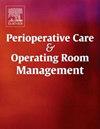Cardiac monitoring and cardiovascular event incidence in patients over 50 with ICU needs undergoing abdominal/vascular surgery: Insights from a tertiary care facility
IF 1
Q2 Nursing
Perioperative Care and Operating Room Management
Pub Date : 2025-01-16
DOI:10.1016/j.pcorm.2025.100472
引用次数: 0
Abstract
Background
As the global population ages, the vulnerability of older adults (≥50 years) undergoing major non-cardiac surgeries increases significantly, posing greater risks and challenges. This study aims to address the gap in understanding postoperative cardiac complications and associated risk factors in this demographic.
Methods
A retrospective observational study was conducted to identify 100 patients aged 50 or older who underwent major abdominal or vascular surgeries requiring ICU admission for more than 24 h. MACE incidence, including myocardial infarction, unstable angina, heart failure, arrhythmias, stroke, and cardiac death, was assessed. Logistic regression analyzed preoperative risk factors.
Results
Postoperatively, 18 % experienced MACE events, including acute coronary syndrome, unstable angina, and cardiac death. Vascular surgeries correlated with increased mortality risk (p < 0.001). Hypertension emerged as a significant risk factor (OR 10.88, p < 0.02), alongside abnormal echocardiogram findings (p < 0.05).
Discussion
The study highlights the significant association of advanced age, hypertension, and echocardiographic abnormalities with MACE in elderly patients undergoing major abdominal/vascular surgeries requiring ICU care. The findings emphasize the importance of perioperative risk stratification, particularly in high-risk groups, to guide surgical planning and improve outcomes. Developing predictive tools, such as MACE risk calculators, could support clinical decision-making.
Conclusion
Age, hypertension, and echocardiographic findings are key MACE predictors in elderly surgical patients requiring ICU care. Future studies should focus on validating risk calculators and optimizing perioperative strategies to improve patient outcomes.
50岁以上ICU患者接受腹部/血管手术的心脏监测和心血管事件发生率:来自三级医疗机构的见解
随着全球人口老龄化,老年人(≥50岁)接受重大非心脏手术的脆弱性显著增加,带来了更大的风险和挑战。本研究旨在解决这一人群在了解心脏术后并发症和相关危险因素方面的差距。方法回顾性观察研究100例年龄在50岁及以上、接受腹部或血管大手术且住院时间超过24小时的患者,评估MACE的发生率,包括心肌梗死、不稳定型心绞痛、心力衰竭、心律失常、卒中和心源性死亡。Logistic回归分析术前危险因素。结果18%的患者术后发生MACE事件,包括急性冠状动脉综合征、不稳定型心绞痛和心源性死亡。血管手术与死亡风险增加相关(p <;0.001)。高血压成为重要的危险因素(OR 10.88, p <;0.02),同时超声心动图发现异常(p <;0.05)。该研究强调了高龄、高血压和超声心动图异常与需要ICU护理的老年腹部/血管大手术患者MACE的显著关联。研究结果强调围手术期风险分层的重要性,特别是在高危人群中,以指导手术计划和改善结果。开发预测工具,如MACE风险计算器,可以支持临床决策。结论年龄、高血压和超声心动图表现是老年外科患者需要ICU护理时MACE的关键预测因素。未来的研究应侧重于验证风险计算器和优化围手术期策略,以改善患者的预后。
本文章由计算机程序翻译,如有差异,请以英文原文为准。
求助全文
约1分钟内获得全文
求助全文
来源期刊

Perioperative Care and Operating Room Management
Nursing-Medical and Surgical Nursing
CiteScore
1.30
自引率
0.00%
发文量
52
审稿时长
56 days
期刊介绍:
The objective of this new online journal is to serve as a multidisciplinary, peer-reviewed source of information related to the administrative, economic, operational, safety, and quality aspects of the ambulatory and in-patient operating room and interventional procedural processes. The journal will provide high-quality information and research findings on operational and system-based approaches to ensure safe, coordinated, and high-value periprocedural care. With the current focus on value in health care it is essential that there is a venue for researchers to publish articles on quality improvement process initiatives, process flow modeling, information management, efficient design, cost improvement, use of novel technologies, and management.
 求助内容:
求助内容: 应助结果提醒方式:
应助结果提醒方式:


